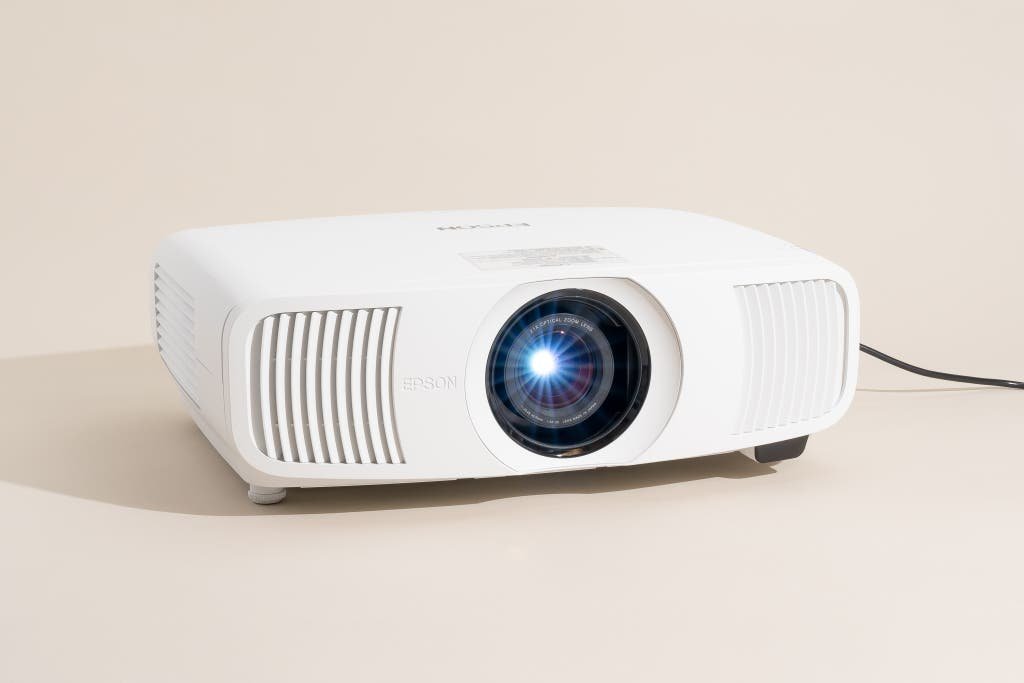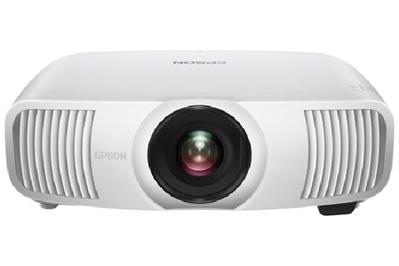
Top pick
Important specs
| Projection tech: | LCD | Zoom and throw: | 2.1x (motorized), 1.35 to 2.84 |
| Light source: | laser | Lens shift: | 96.3% vertical, 47.1% horizontal |
| Refresh rate: | 120 Hz | Smart-TV platform: | none |
| HDMI inputs: | two HDMI 2.1 | 3D support: | no |
| HDR formats: | HDR10, HDR10+, HLG | Size and weight: | 20.5 by 7.6 by 17.6 inches, 28 pounds |
The Epson Home Cinema LS11000 is the most versatile 4K projector we’ve tested. Most projectors are optimized either for bright-room use or dark-room use, as well as for gaming and sports or for movies. But the LS11000 can excel in any environment, with any type of content, and it should last for years.
It has better image contrast than any 4K projector we’ve tested. It accomplishes that by combining high brightness, a good black level, and a well-designed dynamic iris that automatically fine-tunes the lens to suit the image being displayed.
This model gives you an 11-step brightness control to more precisely tailor the light output to your environment. In the LS11000’s best-looking picture mode, Natural, we measured output between 1,005 and 1,867 lumens, the latter of which is ample for a large screen.
We measured output as high as 2,497 lumens in the LS11000’s Dynamic picture mode, but that mode isn’t especially color-accurate, with an overly green color temperature (or color of white) and oversaturated color points. It’ll do for the occasional daytime sports watching or gaming, though.
The higher light output allows for solid HDR performance, too. Bright highlights in movies on Ultra HD disc such as Dune, Justice League, and Pan had decent pop, even when I set the projector at about half its maximum brightness for dark-room viewing.
On the flip side, the LS11000 delivers deeper, darker black levels than most of the lower-priced 4K projectors we’ve tested, so it allows darker movie scenes to look more saturated and three-dimensional in a dark room. The only 4K projectors we’ve tested that have produced deeper black levels have also been notably dimmer overall.
The color accuracy is superb. The LS11000’s Natural picture mode is wonderfully accurate in color temperature, gamma, and color points, requiring no advanced adjustment or fine-tuning. Just set it to the necessary brightness level, and you’re good to go.
Our measurements showed that the LS11000 can handle 88.9% of the large P3 color gamut used for 4K HDR content. We’ve tested a few projectors that can render an even wider color gamut, but most of them are less accurate overall than this Epson model.
The 4K image is clear and detailed. The LS11000 uses Epson’s most advanced pixel-shifting technology to show a 4K resolution on the screen (our test patterns confirmed this), and with movies on Ultra HD discs such as Dune and Justice League and Netflix shows like Our Planet, the image on our 100-inch screen looked crisp and detailed.
The LS11000’s use of an all-glass lens also helps with image clarity, and the Picture menu has an Image Enhancement tool, which allows you to precisely tweak the picture clarity and sharpness to your liking.
It uses a laser light source. This brings several benefits, the most important of which is a long lifespan of 20,000 hours. In bulb-based projectors, the bulbs dim over time, and you need to replace them roughly every 4,000 to 6,000 hours (if you run them at maximum brightness), which adds to the total cost of ownership.
The use of a laser light source also enables this projector to turn on and off much more quickly. It produces rich color, too, and it allows for nearly silent lens adjustments when the projector is employing its dynamic iris.
The 120 Hz refresh rate improves motion clarity for sports and gaming. You can also turn on motion smoothing, if you’re into that kind of thing, though we don’t recommend doing so with movies because it changes the look of film motion, creating the soap opera effect.
This projector’s higher refresh rate and lower input lag (under 20 milliseconds), mated with its two HDMI 2.1 inputs, which can accept a 4K 120 Hz signal, make it a good match for the latest Xbox and PlayStation gaming consoles. The inclusion of HDMI 2.1 is quite rare on projectors.
Epson is more generous with its setup tools than other projector manufacturers. Thanks to the LS11000’s 2.1x zoom, 96.3% vertical lens shift, and 47.1% horizontal lens shift, you can easily place the image precisely on your screen, without having to rely on automatic digital adjustments like keystone correction that degrade the quality of the image.
Plus, all the lens controls are motorized, so you can adjust them via the remote and set up different lens memories for different video aspect ratios, such as 16:9 for HDTV or 21:9 for some movies.
Flaws but not dealbreakers
The LS11000 uses manual HDR tone mapping. Projectors must adjust the HDR signal to show the content properly in the brightness range they’re capable of. Some high-end projectors have advanced automatic tone mapping that intelligently adjusts the signal to avoid cutting off or incorrectly displaying bright highlights. The LS11000 lacks such technology—on this model, you have to manually adjust the HDR brightness using a 16-step slider control.
The better option is to mate this projector with our favorite Ultra HD Blu-ray player, the Panasonic DP-UB820, which handles the automatic tone mapping on its end.
It offers no support for 3D video playback. Though 3D is dead in the world of TVs, it still has a fan base in the projector world. Epson is not the only manufacturer of higher-end 4K projectors that abandoned 3D support (Sony did too), and new 3D content is rare. But if you have a large collection of 3D discs and still want to watch them, this omission could be a dealbreaker.
Source link
[og_img

Top pick
Important specs
| Projection tech: | LCD | Zoom and throw: | 2.1x (motorized), 1.35 to 2.84 |
| Light source: | laser | Lens shift: | 96.3% vertical, 47.1% horizontal |
| Refresh rate: | 120 Hz | Smart-TV platform: | none |
| HDMI inputs: | two HDMI 2.1 | 3D support: | no |
| HDR formats: | HDR10, HDR10+, HLG | Size and weight: | 20.5 by 7.6 by 17.6 inches, 28 pounds |
The Epson Home Cinema LS11000 is the most versatile 4K projector we’ve tested. Most projectors are optimized either for bright-room use or dark-room use, as well as for gaming and sports or for movies. But the LS11000 can excel in any environment, with any type of content, and it should last for years.
It has better image contrast than any 4K projector we’ve tested. It accomplishes that by combining high brightness, a good black level, and a well-designed dynamic iris that automatically fine-tunes the lens to suit the image being displayed.
This model gives you an 11-step brightness control to more precisely tailor the light output to your environment. In the LS11000’s best-looking picture mode, Natural, we measured output between 1,005 and 1,867 lumens, the latter of which is ample for a large screen.
We measured output as high as 2,497 lumens in the LS11000’s Dynamic picture mode, but that mode isn’t especially color-accurate, with an overly green color temperature (or color of white) and oversaturated color points. It’ll do for the occasional daytime sports watching or gaming, though.
The higher light output allows for solid HDR performance, too. Bright highlights in movies on Ultra HD disc such as Dune, Justice League, and Pan had decent pop, even when I set the projector at about half its maximum brightness for dark-room viewing.
On the flip side, the LS11000 delivers deeper, darker black levels than most of the lower-priced 4K projectors we’ve tested, so it allows darker movie scenes to look more saturated and three-dimensional in a dark room. The only 4K projectors we’ve tested that have produced deeper black levels have also been notably dimmer overall.
The color accuracy is superb. The LS11000’s Natural picture mode is wonderfully accurate in color temperature, gamma, and color points, requiring no advanced adjustment or fine-tuning. Just set it to the necessary brightness level, and you’re good to go.
Our measurements showed that the LS11000 can handle 88.9% of the large P3 color gamut used for 4K HDR content. We’ve tested a few projectors that can render an even wider color gamut, but most of them are less accurate overall than this Epson model.
The 4K image is clear and detailed. The LS11000 uses Epson’s most advanced pixel-shifting technology to show a 4K resolution on the screen (our test patterns confirmed this), and with movies on Ultra HD discs such as Dune and Justice League and Netflix shows like Our Planet, the image on our 100-inch screen looked crisp and detailed.
The LS11000’s use of an all-glass lens also helps with image clarity, and the Picture menu has an Image Enhancement tool, which allows you to precisely tweak the picture clarity and sharpness to your liking.
It uses a laser light source. This brings several benefits, the most important of which is a long lifespan of 20,000 hours. In bulb-based projectors, the bulbs dim over time, and you need to replace them roughly every 4,000 to 6,000 hours (if you run them at maximum brightness), which adds to the total cost of ownership.
The use of a laser light source also enables this projector to turn on and off much more quickly. It produces rich color, too, and it allows for nearly silent lens adjustments when the projector is employing its dynamic iris.
The 120 Hz refresh rate improves motion clarity for sports and gaming. You can also turn on motion smoothing, if you’re into that kind of thing, though we don’t recommend doing so with movies because it changes the look of film motion, creating the soap opera effect.
This projector’s higher refresh rate and lower input lag (under 20 milliseconds), mated with its two HDMI 2.1 inputs, which can accept a 4K 120 Hz signal, make it a good match for the latest Xbox and PlayStation gaming consoles. The inclusion of HDMI 2.1 is quite rare on projectors.
Epson is more generous with its setup tools than other projector manufacturers. Thanks to the LS11000’s 2.1x zoom, 96.3% vertical lens shift, and 47.1% horizontal lens shift, you can easily place the image precisely on your screen, without having to rely on automatic digital adjustments like keystone correction that degrade the quality of the image.
Plus, all the lens controls are motorized, so you can adjust them via the remote and set up different lens memories for different video aspect ratios, such as 16:9 for HDTV or 21:9 for some movies.
Flaws but not dealbreakers
The LS11000 uses manual HDR tone mapping. Projectors must adjust the HDR signal to show the content properly in the brightness range they’re capable of. Some high-end projectors have advanced automatic tone mapping that intelligently adjusts the signal to avoid cutting off or incorrectly displaying bright highlights. The LS11000 lacks such technology—on this model, you have to manually adjust the HDR brightness using a 16-step slider control.
The better option is to mate this projector with our favorite Ultra HD Blu-ray player, the Panasonic DP-UB820, which handles the automatic tone mapping on its end.
It offers no support for 3D video playback. Though 3D is dead in the world of TVs, it still has a fan base in the projector world. Epson is not the only manufacturer of higher-end 4K projectors that abandoned 3D support (Sony did too), and new 3D content is rare. But if you have a large collection of 3D discs and still want to watch them, this omission could be a dealbreaker.
The 2 Best 4K Projectors of 2025
[title_words_as_hashtags




